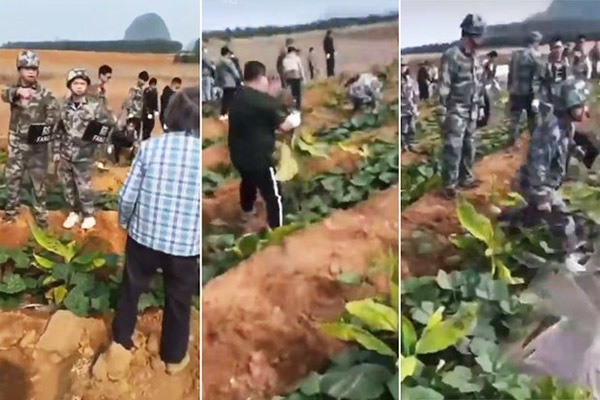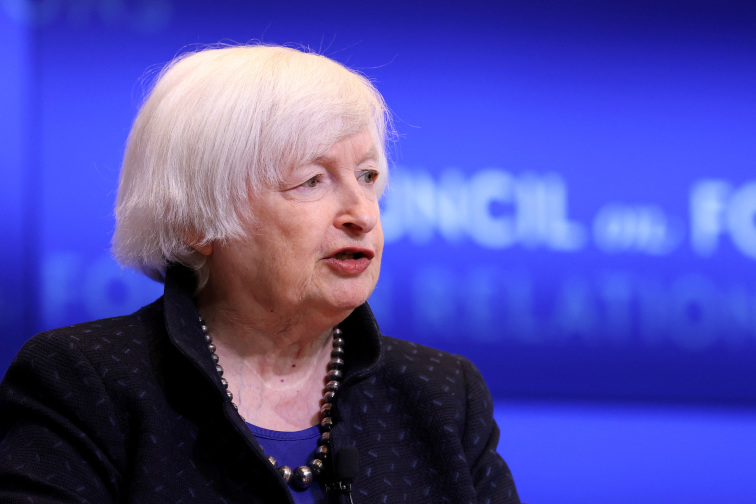Online videos show that "agriculture management" has damaged the tobacco, vegetables, and other crops planted by farmers.
[People News] Recently, the state-owned enterprise China Railway 14th Bureau, under the high-level agricultural policies of the CCP, has contracted 15,000 acres of land in Shandong, sparking heated discussions online. People are concerned about the livelihood and future prospects of farmers who lose their land. As more farmers face hunger, and with a growing social instability, many are wondering where the farmers will go. The "historical changes" Xi Jinping often refers to could indeed become a reality.
Under the CCP's tyrannical rule for over 70 years, the household registration system (hukou) has turned hundreds of millions of Chinese farmers into second-class citizens. Before the economic reforms, the CCP prohibited farmers from working or living in cities, buying grain from state stores, and even sent their children to school in the cities. Farmers’ children were forced to follow in their parents' footsteps as farmers with no medical benefits, pensions, or other welfare programs, living in poverty for many years. After the reforms in the 1980s, with the revival of the market economy and the influx of foreign capital, urban areas began needing large amounts of labor. The CCP slightly relaxed its control over farmers, allowing them to work in cities, leading to the emergence of the "migrant worker" population. Although farmers' income improved and their social status was somewhat better, the economic development between urban and rural areas remained imbalanced, and the income gap widened sharply. Those dependent on farming were almost the poorest population. According to data from Nine Commentaries on the Communist Party, by 1997, the income gap between urban and rural residents had expanded from 1.8:1 in the mid-1980s to 3.1:1.
Even today, farmers still cannot enjoy the same benefits as urban residents, and ensuring their basic needs and fighting poverty remain their top priority. While the CCP at all levels of government continues to seize land and sell off farmland, boasting about the GDP data that has impressed the world, it turns a blind eye to the poverty of farmers, even deceiving the outside world by claiming to have eliminated poverty.
After the pandemic, China’s economy faced a major downturn, with foreign capital and factories leaving the country, creating a large unemployed population unsure of how to survive. Farmers who had been working in city factories were forced to return to the countryside, relying on the little remaining farmland. However, recently, the CCP authorities have intensified their actions, forcing farmers to sell their land through large enterprises seizing land. Isn't this driving farmers to the brink of despair? The question of farmers’ future has become a hot topic online.
According to mainland media reports, the state-owned enterprise China Railway 14th Bureau recently won the rights to operate 15,000 acres of basic farmland in Dongying City, Shandong Province, through bidding. The crops grown include corn, wheat, and rice, and they have established a professional team of nearly 100 people.
According to the CCP’s publicly announced policies, by 2030, the goal is to establish 1.2 billion acres of high-standard farmland, with large investments and encouragement for social capital to participate. The CCP had also planned to build 10,000 new farms.
The decision of the China Railway 14th Bureau, which does not build houses or bridges but instead ventures into agriculture, has sparked much debate and concern from various sectors of society.
Some farmers have expressed confusion after hearing about the China Railway 14th Bureau’s actions, particularly farmers who have worked the land all their lives, wondering what the future holds. Many bloggers share similar concerns.
Shandong blogger "Zhijing Shuo Business" mentioned in his program on December 19, "A professional team growing food—this is grabbing jobs from the common people. Can we understand this as farmers disappearing soon?" He gave an example: "A couple of years ago, the CCP encouraged farmers to sell their land with a few thousand yuan in subsidies to buy houses in county towns, and then there was land transfer. They said it was voluntary to sell land, but if you don't want to sell, you can transfer it, which lasts decades. A few thousand yuan for one acre—how is that different from selling it? What can you do with that money?"
He also mentioned that land recovery is even harsher, with the government directly buying up all the farmers' land. "Farmers' land is taken away, and we don’t know if it's given to the state or to capitalists. Will we end up paying ten or twenty yuan for a bun in the future? Farmers have worked the land their whole lives, but in the end, they can't even afford to eat?"
Guangdong blogger "Nongren Junshi" also expressed concerns in his program on December 11, saying, "Large state-owned enterprises, with ample funds and resources, are taking away the livelihood of ordinary people. Are they asking farmers to go to the city to work? There is no basic protection. This is state-owned enterprises grabbing jobs from farmers and cutting off ordinary people's livelihood?"
A mainland industry expert, Lao Pan, who has been involved in business investment for over a decade, recently said, "This situation shows that competition is getting fiercer. It indicates that it's becoming harder for ordinary people to start a business or even make a living. In the future, ordinary people will have to rely on large platforms to survive. Starting their own business will be even more difficult, as opportunities are becoming rarer."
Some commentators believe that the China Railway 14th Bureau’s entry into farming is just the beginning. With the support of the CCP's national policies, more state-owned enterprises will likely enter the agricultural sector in the future.
David Huang, a Chinese-American economist, told The Epoch Times that in this wave of land acquisition and transfer, it is difficult to protect the interests of farmers. Losing their land will severely affect their livelihood. "The final result may be like what happened a couple of years ago with rice going to the mountains—ultimately, it’s a mess, and all resources are wasted. It’s not just about the disappearance of the original forests, the loss of water and soil—it’s a waste of land and human resources."
Huang cited the Soviet collective farms and China’s People's Communes, which ultimately led to farmers losing their land, production funds were stifled, and the outcome was a food crisis. During the People's Communes, many people died from hunger. "It wasn’t until the 1980s when China returned land to the people under the responsibility system that the agricultural problem was resolved."
Huang believes that the CCP’s national-level strategic approach is, in fact, a return to the forced collectivist economic model of the past, which has been implemented in countries like China, Cambodia, Myanmar, Vietnam, and the Soviet Union. Even places with abundant agricultural resources have experienced food shortages and even starvation.
Now, many unemployed migrant workers have returned to the countryside, and state-owned enterprises are increasingly taking away farmland from farmers. This is another harsh blow by the CCP to farmers, cutting off their livelihoods. As food is vital to life, farmers who lose their means of survival, along with the growing number of unemployed people in cities, create a turbulent and unstable social situation. As people struggle to survive, they may be driven to rebellion, leading to regime change. Xi Jinping’s "historic changes" may indeed become a reality.
In 2009, The Epoch Times published an article titled "China’s Farmers Hate," written by Zhang Tianliang. In it, the author stated: "Foreign businesses have withdrawn their technology and capital, migrant workers face mass unemployment, and their sources of livelihood are cut off. Returning home to farm again? But the land has already changed hands. There’s no place to live. With parents above and wife and children below, where can we settle? This is the tragic fate of farmers in today’s China. Chinese farmers hate the Communist Party for being ruthless, using farmers to seize power, defeating the ‘landlords, rich, counterrevolutionaries, bad elements, and rightists,’ robbing their property, and then exploiting them cruelly, even slaughtering them on a large scale. Now, under the banner of reform and opening up, they’re plundering farmers' land, forcing us to have no way home and no country to run to. Are we going to just wait to die? Let’s unite, and the Chinese farmers who refuse to be slaves will use our blood and tears to indict the Communist Party, resist it, and collapse it, thus burying the Communist Party."










News magazine bootstrap themes!
I like this themes, fast loading and look profesional
Thank you Carlos!
You're welcome!
Please support me with give positive rating!
Yes Sure!